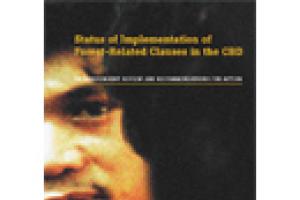After five weeks of functioning, the Parliamentary Commission of Enquiry (CPI), created to investigate irregularities related to Aracruz´ activities in the state of Espirito Santo, has already revealed a large number of complaints, irregularities and illegal activities of the multinational over the past 30 years.
Brazil
Bulletin articles
15 April 2002
Since their arrival in the Amazon, “white men” have had an ever-increasing impact on that region. However, it was not until World War 2 that deforestation became a large-scale process. Today, some 80% of the Amazon forest is still standing, but estimations are that its destruction will be completed in the next decades if nothing is done to stop it. The hope that “something” could be done was closer than ever in 1989, when the first meeting of indigenous peoples was held in Altamira.
Bulletin articles
15 April 2002
It is worth noting that many people are not aware of the great diversity of ecosystems of the South American continent. Its great longitude and altitude variation, ranging from sea level to over 7000 metres, as well as its great variety of climates, enables the presence of diverse and different ecosystems, including the largest tropical rainforest (the Amazon Rainforest) and the planet's driest desert (Atacama desert).
Other information
18 March 2002
Commissioned by the Global Forest Coalition
This report is based on 21 country case studies, including Australia, Brazil, Cameroon, Canada, Chile, Colombia, Czech republic, Ghana, India, Indonesia, Kenya,Malaysia, the Netherlands, New Zealand/Aotearoa, Papua New Guinea, Russia, South Africa, Suriname, Uganda, United Kingdom, and Uruguay
Bulletin articles
15 March 2002
It is sad to see that, while the governments of the world --including the Brazilian government-- are preparing to participate in the Conference of the Parties to the Convention on Biological Diversity, some representatives of the people of the State of Espiritu Santo, whose very threatened biodiversity is among the richest in the world, do not show the least concern over the matter.
Bulletin articles
20 February 2002
An independent scientific investigation carried out by a research team of U.S. and Brazilian scientists led by William Laurance of the Smithsonian Tropical Research Institute, has provided compelling evidence that rates of forest destruction in the Brazilian Amazon have accelerated sharply since 1995, returning to the catastrophic levels of the 1970s and 1980s. The research opposes the claims of the Brazilian government that threats to Amazonian forests have fallen in recent years because of improved environmental laws and public attitudes.
Bulletin articles
21 January 2002
As a result of successful campaigning efforts in the state of Espirito Santo --where Aracruz Cellulose has its huge pulp mill and most of its eucalyptus plantations-- the state Parliament passed a law banning further eucalyptus planting until an agroecological study is carried out to decide where the tree can and cannot be planted.
Other information
21 December 2001
More than 80 percent of timber from the Amazon is logged illegally, and mahogany --also known as the “green gold”-- has been the main target of such operations. Mahogany's value --a cubic meter can fetch more than US $1,600 per cubic meter-- has attracted loggers who encroach deep into pristine forests to supply a demand almost exclusively aimed at export markets.
Bulletin articles
27 November 2001
What has recently happened in the Brazilian state of Espirito Santo is a great motivation for people struggling throughout the world to halt the further spread of monoculture tree plantations. The news is that the State Parliament finally passed a law --after lifting the Governor's veto by 20 votes in 25-- which bans eucalyptus plantations in the state until an agroecological mapping --which will determine where eucalyptus can and cannot be planted-- is carried out.
Bulletin articles
11 September 2001
The growing consolidation of land by Aracruz Celulose in Espirito Santo and in the extreme south of Bahia, followed by plantation of eucalyptus monocrops, is generating increasing opposition. A sign of this was the International Seminar on eucalyptus and its impacts organized last August by the Legislative Assembly of the State of Espirito Santo (see WRM Bulletin 49). However the responsible State bodies do not seem to be willing to undertake the studies necessary to regulate this activity.
Other information
11 September 2001
One of the most commonly used arguments by those promoting large scale monoculture tree plantations is that they generate employment. As we will see from the following examples, such arguments are false.
Bulletin articles
11 August 2001
What is happening in Espirito Santo --one of the smallest Brazilian states-- is historic. Mighty plantation and pulp company Aracruz Celulose has generated so much opposition stemming from its activities, that the state Parliament recently passed --almost unanimously-- a law banning further planting of eucalyptus until an agro-ecological mapping of the state is put in place, which will define where eucalyptus can and cannot be planted. The law was immediately vetoed --during a "solemn session"-- by the Governor and now Parliament must decide whether to lift or maintain the veto.

